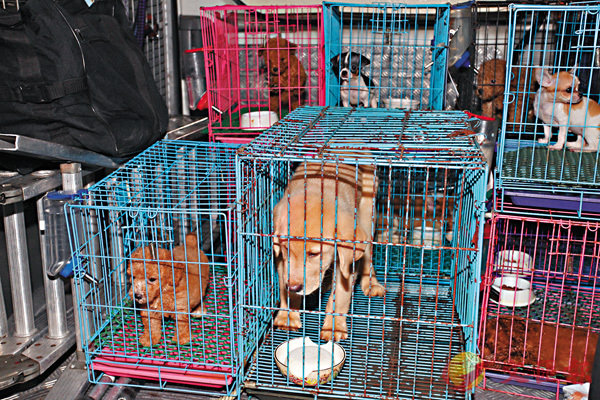 ���䩲����s�W�[�h�ݰʪ����@�h�C ��ƹϤ�
���䩲����s�W�[�h�ݰʪ����@�h�C ��ƹϤ��i���j�F����ij�רҥ[���h�ݰʪ����@�h�A�̰��D�@�ѺʸT3�~�אּ10�~�A�S��ij�ޤJ�u�ԷV�d����v�C��ݰʪ����A�O���|������䤤�@�ӭ��n�ФءA�[�j�O�@�ʪ��B���ɰʪ��֧Q�A��O���y��y�C����O�@�ʪ����k�Ҧ��w�L�ɡA���|�I�~���������k�Ҧh�ɡA��������ij�ȱo�֩w�M����C���ݬF���������n�����Ըߤu�@�A�ɧ֧����ߪk�A�æb���k�h���W�[�귽�M���ΧN��q�A�i�@�B�u�ƪ��|���ʪ��O�@���ҡC
��2016�~�ܥh�~�Y�T�u�A���@�p�����C�~�����300�v�h�íh�ݰʪ��ӮסA���\�˱�47�v�A�̭��D�����ʸT16�Ӥ�C����ɦ��ǥX�b�Hť�D���h�ݰʪ��סA��~�����F�ʪ��A�O�h�~3�멳ĵ��q��������Ϧ^�@���Z���Ȫ����A���k�٤��D�H�A���4�ѫ�N�o�{�����Q�D�H�Ѥѥx�~�����ũR�C���P�x�̲q�D�_�I�Ȭ����֩�6�Ӥ�ʸT�A�̲קP�B�Q�i4�Ӥ���|�O�C�ʫO����M���|�ֽק������k�Ҫ��~�O�����A�Ǹo�����L�C�C
�ھڡm����ݻŹ�ݰʪ����ҡn�A�{�ɳ̰��D�@�O�@��20�U���ʸT3�~�A�������רҫ�ij�[���ܺʸT10�~�C�P�ɤޤJ�u�ԷV�d����v�A�n�D�D�H�����ʪ����ѦX�A�����Υͬ����ҵ��C�o�O�P�ɨöi���@�B�C
�ڬ����a��O�@�ʪ����z���A���w������u�h�ݡv�A�ӬO���ɨ����D���@�ʪ��v�q�κ֧Q���h���A���I�N�b��V�t�d���U�ʪ����H�ޤJ�u�ԷV�d���v�A�W�w�Ʒ|�o�ͪ��ˮ`�欰�A�p�G�ʪ����U�̨S��T�O��}�i�ʪ����֧Q�A�Y�i�Q�˱��C�o�O�H����ݰʪ����A�שM�z���W�����j�i�B�C
����m����ݻŹ�ݰʪ����ҡn�]�ߩ�1935�~�A�H�^��1911�~���ʪ��O�@�k�Ҭ��ť���g�Ӧ��A�Z����@�ӥ@���C�۸��^�ꦭ�b�Q�h�~�e�H�m�ʪ��֧Q�k�n�]Animal Welfare Act 2006�^���ӥN���A���䰣�F�b2006�~�����@�ڥ~�A�@�������i�歫�j�ץ��C�{�ɥ@�ɤW�w���h�F100�Ӱ�a�M�a�ϭq�ߤF�m�ʪ��O�@�k�n�A�ӥB�@�h�V�ӶV���C�w�ꪺ�k�ҳW�w�A�D�H��i�ʪ��A�̧C�@�ڬO2.5�U�ڤ��]��23�U�䤸�^�A�h�ݰʪ��@�ڧ�|���ƤɯšA�̰��i�P��3�~�C
�۵M�A�ߪk����A�p����k�O�@�j���D�C�b�귽��J�譱�A���ޥ���ĵ��w�����22��ĵ�Ϫ��D�ƽլd���]���B�z�h�ݰʪ����M���A�������W���귽���ʪ��֧Q��´�A�����ϰʪ��γQ�h�ݪ��ʪ����ѷ��U�P��i�A�ȡC�b���k�N�W�A�i�H�ѦҼw�ꬰ�ʪ��ӤJ�����A�@���ʪ��D���A�N�i�H�q�L�����l�d�D�H�������M�d���C
�ƹ�W�A�j�����h�ݰʪ��ƥڷ��A�O�@�ǤH���ʪ��������ۤv������A�]�ߦ�Ӽ�ӹ}�i�A���ܧִN���h�@�߱��U�C�F���h�~�e�w�i�}�ŶǡA�I�~�����b�i�d���e���u���@���A�ܤ@�ܡv�A�I�᪺�z���A���O�j�եD�H���d���ר����U���d���C�{�b�תk�[���@�h�äޤJ�u�ԷV�d���v�������A�L�ìO���T�M���n���C
�]�K���ۭ���m��׳��n����27-4-2019�^
Resources and enforcement crucial to new animal protection laws
�iĶ��jUnder the government's new proposal to strengthen punishment for animal cruelty, the maximum penalty could go up from three years of imprisonment to 10 years. Pet owners will also have a "duty of care" under the new amendments. While animal treatment has always been one of the main criteria of a civilised society, strengthened animal protection and welfare have also become a trend around the globe.
As animal protection laws in Hong Kong have become outdated, and that the society has called for an improvement on the matter for a long time, the authority's proposal is indeed worthy of recognition and support. It is hoped that the authorities would make candid explanations to the public during the consultation period, and complete the legislation procedure as soon as possible. It is also expected that the government would allocate more resources and make the most of technologies when enforcing the new laws, so as to better protect animals in Hong Kong.
Between 2016 and the first three quarters of 2018, the Agriculture, Fisheries and Conservation Department has received on average around 300 suspected animal cruelty reports. There were 47 successful convictions, and the heaviest sentence handed down by the court was 16 months of imprisonment.
Appalling stories of animal cruelty make the headlines in Hong Kong from time to time. The most abhorrent case in recent years would be that in March 2018, a Japanese spitz was thrown off a roof just four days after being rescued by marine police from the Victoria Harbour. The starting point for sentencing was merely a minimum of six months' imprisonment according to the court magistrate who headed the case, and the owner of the dog was given only a four-month hospital order.
Aggrieved by the lenient sentence, the general public and animal welfare groups criticised local laws for failing to achieve a deterrent effect, and that the cost of an offense is way too low.
The current Prevention of Cruelty to Animals Ordinance includes a maximum penalty of three years imprisonment or a fine of HK$200,000.
According to the government's latest proposal, the years of imprisonment could go up to 10. In addition, pet owners will also have a "duty of care", of which animals must be given clean water and a balanced diet, as well as a safe and clean environment. This is an important step which would bring the laws of Hong Kong up-to-date. In the western world, the concept of animal protection has long transcended from the prevention of animal cruelty to the actual welfare of animals. The essence of this transcendence is the duty of care owed to pets. Animal cruelty could be avoided when owners would already face prosecution if they fail to keep their pets in good shape and health. This is a giant leap forward in terms of animal treatment.
First introduced in 1935, the Prevention of Cruelty to Animals Ordinance is based on the Protection of Animals Act 1911 of the United Kingdom. In Britain, the century-old ordinance has been superseded by the Animal Welfare Act 2006 for over a decade now. By contrast, there has been no major amendment to the clearly outdated animal protection laws in Hong Kong, apart from a raised fine in 2006. Currently, more than 100 countries around the world have introduced animal protection laws, and the severity of punishments is ever increasing. In Germany, owners who abandon their pets have to face at least a ��25,000�]approximately HK$230,000�^fine. Those who are convicted of animal cruelty offense would be handed a much larger fine, and be imprisoned for up to three years.
When the proposed amendments come into effect, the big question would be how to enforce the new laws. In terms of resource allocation, although the police have already assigned designated teams to investigate animal cruelty cases in all 22 Police districts with crime investigation units, more resources should be given to animal welfare groups so that abused animals and stray animals can receive care and be adopted. Also, the authorities can draw experience from Germany and introduce microchip technologies, so that owners could be found and held responsible when pets are abandoned.
In fact, the root cause of most animal cruelty cases is that some people treat animals as their own toys. These people buy pets only on impulse, and will neglect their animals as patience quickly wear off. The government has long promoted the idea of "stop and think before bringing a pet home". The rationale behind is to emphasise the owner's responsibility of lifelong care of the pet. Undoubtedly, by strengthening punishment and recognising pet owners' duty to care, the government is making the right and necessary move.��Jeffrey Tse (ywc_jeffrey@hotmail.com)
Exercise
1. ���A�۵M�@�z�p
2. �R�@�ʪ���|
3. �H�D����
4. �����
5. �����c��
Answer
1. Agriculture, Fisheries and Conservation Department (AFCD)
2. Society for the Prevention of Cruelty to Animals
3. euthanasia
4. perpetrator
5. puppy mill

